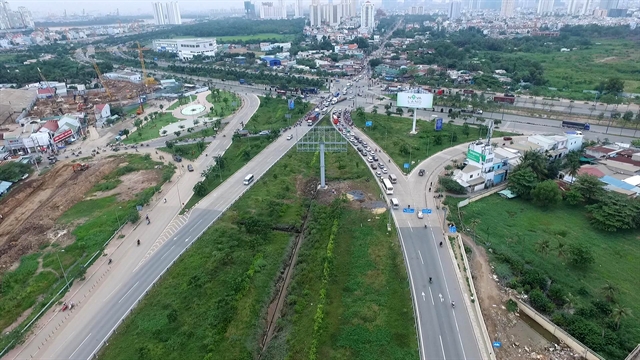 Society
Society

Developing the transport network in the south needs closer regional linkages and solutions to respond to climate change threats, Dương Như Hùng of the HCM City University of Technology has said.

|
| Development of transport infrastructure in the south falls short of growing demand. — VNS Photo Ngọc Diệp |
HCM CITY — Developing the transport network in the south needs closer regional linkages and solutions to respond to climate change threats, Dương Như Hùng of the HCM City University of Technology has said.
Speaking at a workshop in HCM City last Saturday on identifying problems and finding solutions for sustainable development of transportation, he said developing transport infrastructure would help attract more foreign direct investment.
If the quality of transport infrastructure increases by 10 per cent, FDI would increase by 24 per cent and per capita income by 23 per cent, he said.
“The four main factors that need attention are the quality of planning, management of transport infrastructure quality, capital resources, and climate change.”
"Investment is skewed too much in favour of roads," he said, pointing out that while inland waterways carry double the traffic as roads, they get only 14 per cent of the total investment in transport infrastructure and a fifth of the investment in roads.
"The poor infrastructure leads to high transport costs and restricts trade competitiveness.
"Road transport costs 10-60 per cent more than waterway transport," he said.
“We need to increase the ratio of investment in inland waterways.”
But funding is limited, and bank loans account for 80-90 per cent of the cost of transport projects, according to Hùng.
The Government should consider issuing infrastructure bonds and allowing flexible policies with regard to property taxes and investment for some localities, he said.
Research into new building materials that can adapt to climate change, improving the efficiency of the Road Maintenance Fund and giving HCM City a leading role in planning transport infrastructure were also needed.
Dr Martijin van de Groep, an expert on adaptive delta management, said it was necessary to focus clearly on the natural characteristics and competitive advantages of Cửu Long (Mekong) Delta.
The delta had a modern, commercial agricultural sector specialising in high-quality agro-food products, he said.
"A high-quality transport infrastructure is essential for a well functioning, modern, high-tech, competitive agro-based economy."
Urban and industrial development was concentrated in the HCM City-Cần Thơ corridor and socio-economic development lagged in rural areas, resulting in the migration of landless people, he said.
The delta had developed into a diversified economy with multiple primary, secondary and tertiary sector activities concentrated in designated economic zones, he said.
“It needs impeccable integrated planning and regional co-ordination.”
"It needs a multi-year programme for infrastructure, spatial planning and transport," he said.
Deputy Minister of Construction Nguyễn Đình Toàn said the development of transport infrastructure must be linked closely with the urban planning for each locality and the overall region.
More multi-modal transport policy recommendations would be required to find ways to improve intra-regional connectivity in the south, he said.
The workshop was organised by the Việt Nam National University-HCM City. — VNS




